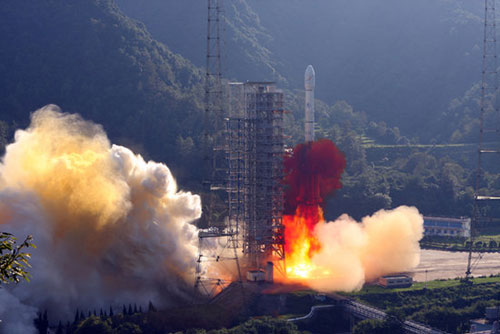The failure to put a satellite into orbit earlier this week is only one bump on a long road of successes, said a space expert.
The setback occurred Monday when the third stage of a Chinese-made rocket failed to fire, causing the Indonesian telecom satellite Palapa D that it was carrying to miss its orbit.
The rocket, called the Long March 3B, was launched at the Xichang Satellite Launch Center in Southwest China's Sichuan province, one of the country's two major sites for rocket liftoffs. It is China's main launcher for commercial missions.
 |
|
Indonesian communications satellite Palapa D has been captured and is now able to conduct orbit maneuver, a few hours after an announcement that it failed to enter a preset orbit following its launch at 5:28 p.m. Monday. [CFP] |
The mishap is the first glitch in a string of 75 successful launches for China's rocket program dating to October 1996, said Pang Zhihao, researcher and deputy editor-in-chief of the monthly Space International.
"At more than 90 percent, China has as high a success rate as Russia, the US and Europe in launching rockets," he said.
The Palapa D satellite, owned by Indonesian satellite communications company Indosat, was supposed to provide satellite links and broadcast services for Indonesia and other Southeast Asian countries.
However, the satellite still has a chance to enter its preset orbit.
The satellite's manufacturer, French company ThalesAlenia Space, said the satellite has been captured and is now able to maneuver.
In 2001, the European Space Agency spent 18 months getting the Artemis telecommunications satellite into its target orbit after an unsuccessful launch from Kourou, French Guiana, in South America.
"Though maneuvers may use much of the fuel in the satellites and shorten their life spans, it is better than giving up and having nothing left," Pang said.
China Great Wall Industry Corporation, which provides the orbit delivery service, and ThalesAlenia both declined to comment Tuesday.
A China Great Wall Industry staff told China Daily on condition of anonymity that the corporation is in talks with the Indonesian side to decide what actions will be taken.
China experienced major setbacks between 1994 and 1996, but regained its international reputation after tightened quality control and a series of successes.
Pang pointed out that launching a satellite is risky, and other countries have also experienced failures.
Recent examples include a protective nose cone fairing on the US Taurus-XL rocket failing to separate during ascent, leading to the Orbiting Carbon Observatory, a pioneering satellite designed to map carbon dioxide concentrations, to crash into the ocean near Antarctica in February this year.
South Korea also failed to send its satellite, carried by its first launch vehicle, into its target orbit on Aug 25.
(China Daily September 2, 2009)